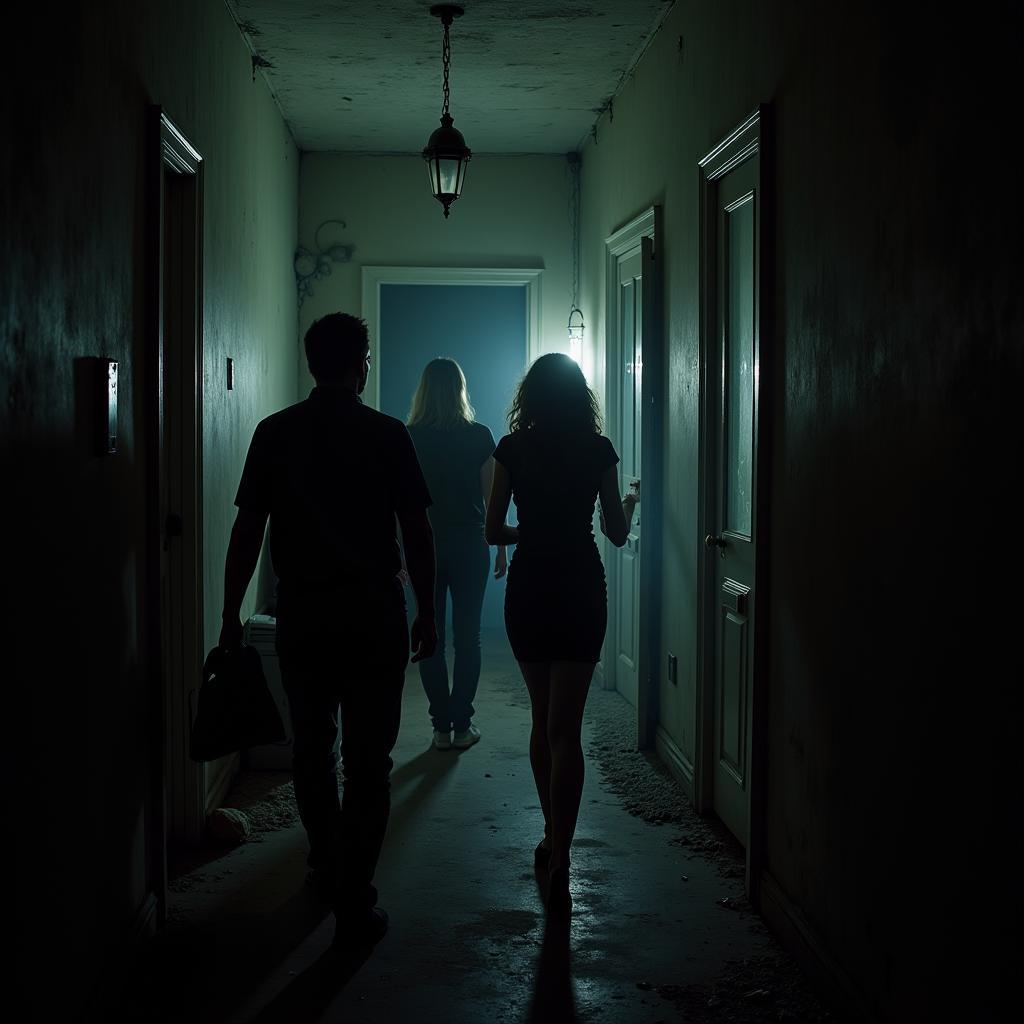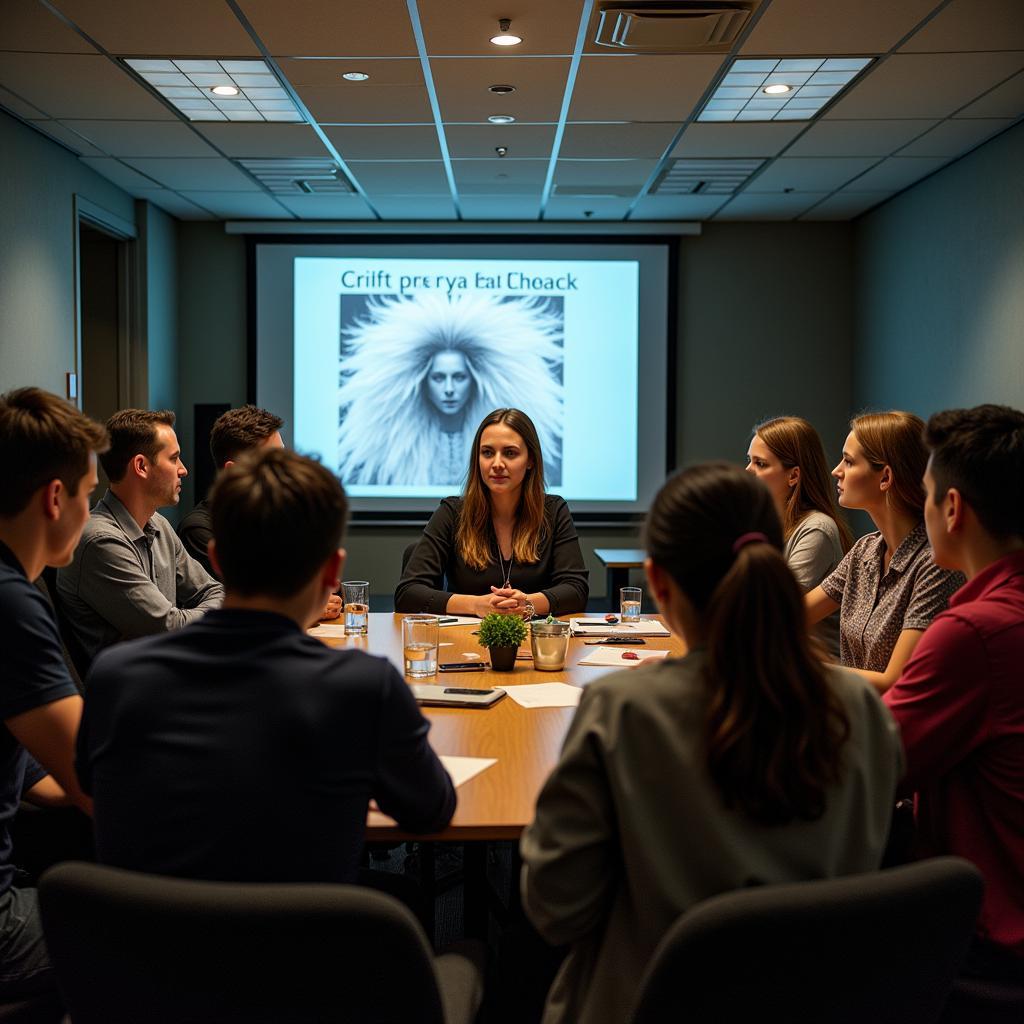Qualitative research offers a unique lens through which we can explore the unexplained and delve deeper into the mysteries of the paranormal. Unlike quantitative research, which focuses on numerical data and statistical analysis, qualitative research embraces the subjective nature of experiences, seeking to understand the “why” behind the phenomena.
If you’re drawn to the world of ghosts, ESP, or unexplained occurrences, qualitative research can be a powerful tool in your investigative arsenal. Let’s explore some intriguing Qualitative Research Ideas that can help shed light on the shadowy corners of the paranormal.
Delving into the Hauntings: Exploring the Human Side of Haunted Locations
 Paranormal Researchers Exploring a Haunted House
Paranormal Researchers Exploring a Haunted House
One of the most captivating areas of paranormal research is the study of haunted locations. While EMF readers and EVP recorders can capture intriguing anomalies, qualitative research allows us to explore the human side of these haunting experiences.
Qualitative Research Ideas for Haunted Locations:
- In-depth interviews with individuals who have experienced paranormal activity: What specific events did they witness? How did these experiences make them feel? Did these experiences align with local legends or historical events?
- Analyzing historical documents and local folklore: Are there recurring themes or patterns in the stories associated with a specific location? How do these narratives shape our understanding of the haunting?
- Observational studies of paranormal investigation groups: How do these groups approach their investigations? What methods do they use, and how do they interpret their findings?
Beyond the Veil: Understanding the Human Capacity for Psychic Abilities
 Woman Meditating with Glowing Aura
Woman Meditating with Glowing Aura
From telekinesis to clairvoyance, the potential of the human mind remains a realm of profound mystery. Qualitative research can help us gain a deeper understanding of these extraordinary abilities, exploring not just their existence, but also their impact on individuals and society.
Qualitative Research Ideas for Psychic Abilities:
- Life history interviews with individuals who claim to possess psychic abilities: How did they discover their abilities? How has having these abilities impacted their lives?
- Ethnographic studies of psychic communities: What are the shared beliefs, practices, and social structures within these groups?
- Case studies of individuals who have reported precognitive dreams or experiences: Can we identify commonalities or patterns in these experiences? What factors might contribute to precognitive abilities?
Unmasking the Unexplained: Examining the Social and Cultural Influences on Paranormal Beliefs
 Diverse Group Discussing Paranormal Phenomena
Diverse Group Discussing Paranormal Phenomena
Paranormal beliefs are deeply intertwined with our cultural backgrounds, personal experiences, and social interactions. Qualitative research allows us to unpack these influences, exploring how and why certain beliefs persist and evolve across generations.
Qualitative Research Ideas for Paranormal Beliefs:
- Focus groups exploring how individuals from different cultural backgrounds perceive and interpret paranormal phenomena.
- Content analysis of paranormal-themed media (books, movies, TV shows): How are paranormal phenomena portrayed? What messages do these portrayals convey about the unknown?
- Investigating the role of personal experiences in shaping paranormal beliefs: How do childhood experiences, family narratives, or significant life events influence our openness to the paranormal?
The Power of Perspective: Embracing Diverse Research Methods
Qualitative research is not limited to one single approach. Just as paranormal investigators utilize various tools to explore the unseen, researchers can draw upon a variety of methods to illuminate the human experience of the paranormal.
Here are a few examples:
- Grounded Theory: Develop theories about paranormal phenomena based on the data collected from interviews, observations, and other qualitative sources.
- Ethnography: Immerse yourself in a particular community or group involved in paranormal research or experiences, such as ghost hunting groups or psychic development circles.
- Narrative Analysis: Analyze personal accounts of paranormal encounters, paying attention to the structure, language, and emotions conveyed in these stories.
Seeking Answers in the Shadows
The field of paranormal research is ripe with potential for those who dare to explore its uncharted territories. By embracing qualitative research, we can move beyond simply documenting the unexplained and begin to understand the human experiences and beliefs that shape our perceptions of the unknown.
Remember, the most compelling research often arises from curiosity, an open mind, and a willingness to explore beyond the boundaries of conventional thought. What mysteries will you uncover?
For more insights into research methods, explore these related articles:
Ready to Dive Deeper?
Contact us at 0904826292 or research@gmail.com. Our team of experienced Paranormal Researchers is available 24/7 to provide guidance and support for your next investigation. You can also visit us at No. 31, Alley 142/7, P. Phú Viên, Bồ Đề, Long Biên, Hà Nội, Việt Nam.